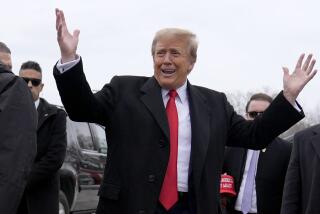In Political Games, Too, It Ain’t Over Till It’s Over
- Share via
WASHINGTON — Republicans have sent early campaign leaders to their presidential nominations more often than Democrats have, front-runner lore that points to the rewards and risks awaiting initial favorites.
For the 2000 campaign, that means Texas Gov. George W. Bush and Vice President Al Gore.
But as Gore observed in discounting polls that rate both Bush and Elizabeth Hanford Dole ahead of him in a final contest for the White House, the 1999 surveys are predictions too far in advance to foretell the next election.
“Polls will not determine the outcome in any way,” Gore told CNN. “Ideas will.” And money. In that crucial competition, the early polls do help leaders draw donors.
There have been six open contests, without incumbents running, for Republican nominations since 1960, and in four of them, the leaders in the early polls won the nomination. In six open Democratic campaigns, the preseason front-runner won only once.
The Pew Research Center for the People and the Press tracked the pattern.
Two early Democratic leaders chose not to run: Mario Cuomo in 1992 and Sen. Edward M. Kennedy in 1976. President Clinton and former President Carter won those nominations.
Early Leaders Often Falter
Among others, in both parties, there are lessons that could apply this time.
The fall of Sen. Edmund S. Muskie in 1972, for example. He was the towering early favorite after a winning performance in a losing campaign for vice president. Muskie reaped Democratic endorsements, campaigned in a style tailored to an obvious winner who didn’t want to risk blunders, and made them as soon as the real competition began. His lead vanished and so did his chances. It was said at the time that his support had been as broad as it was shallow. Sen. George McGovern won that nomination.
Or Gov. George Romney of Michigan, the earliest leader among GOP candidates for 1968. He’d just swept to reelection by a landslide. He had gained broad support among minorities, including 30% of the black vote, unmatched for a Republican in that era.
The presidential preference polls reflected it; for six months, he was rated a likely winner over President Lyndon B. Johnson in 1968.
But he stumbled as a national campaigner, lacking the organization and adroitness of Richard M. Nixon, who quickly displaced him as the leading entry. Romney was out of it before the first primary.
Gov. Bush has the early advantages of both. He’s been endorsed for the 2000 nomination by more than half of the 31 Republican governors and by more than 80 Republicans in Congress. Party leaders have been coming to him in Austin; he’s campaigning at home through the spring, saying he won’t travel nationally until the Texas Legislature adjourns.
Dole is his closest rival in the early polls, with the rest of a nine-man field trailing them.
She opened in Des Moines, Iowa, presenting herself as a non-politician--although she has been in government longer than the others, and campaigned nationally for her husband, Bob, the 1996 GOP nominee. “I’m not a politician, and frankly I think that’s a plus today,” she said. Although she did mention in passing that she’s been in all 99 counties of Iowa, where the first contest of 2000 will be held.
In contrast to the crowded GOP field, there are only two Democrats running: Gore and former Sen. Bill Bradley of New Jersey. It could remain that way; several prominent politicians already have ruled out a run.
The Pew survey notes that Gore’s poll standing is not unlike that of Vice President George Bush 12 years ago, when he was rated behind the leading Democratic prospects. They faltered, and he won.
Gore is viewed favorably by 58% of Americans now, a solid rating but not as good as Bush’s at this point in 1987.
All those numbers add up only to a guessing game. But they also show what can happen to candidates who look like sure winners this far in advance.
“Polls are simply predictions of the future,” Gore said, although pollsters call them snapshots of the present. Either way, they can change overnight when the real competition begins.
“And you know the old saying that six months is a lifetime in politics,” the vice president said.
More to Read
Get the L.A. Times Politics newsletter
Deeply reported insights into legislation, politics and policy from Sacramento, Washington and beyond. In your inbox twice per week.
You may occasionally receive promotional content from the Los Angeles Times.










